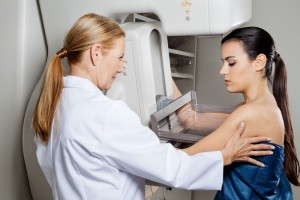Who gets Breast Cancer?

Breast cancer is the most common cancer that women get. It is the second leading cause of cancer deaths, after lung cancer. It has been estimated that 1 in 9 women will be diagnosed with breast cancer. Breast cancer arises in the cells that make up the tissues of the female breast. Several factors can increase a woman’s risk for breast cancer. If a woman’s mother, sister, or daughter had breast cancer, she is more likely to get it. Some families carry genes that predisposes them to breast cancer. The genes are called BRCA-1 and BRCA-2. Women who carry these genes are also at increased risk for ovarian cancer. Most women who get breast cancer do not carry these genes. Hormone exposure also increases a woman’s risk for breast cancer. Women who took the birth control pill or hormone replacement are at slightly increased risk. Many women who get breast cancer don’t have any risk factors.
Can Breast Cancer be Cured?
Yes, if it’s found and treated before it’s spread beyond the breast. This is why early detection is so important.
What is Early Detection of Breast Cancer?
There are three ways that breast cancer is detected early. First, a woman should examine her own breasts once a month and report any changes (such as a lump) to her doctor. Second, a woman should have a breast examination once a year from her regular doctor. Third, a woman should have yearly mammograms beginning at age 40 (or earlier if there is a strong family history of breast cancer). A woman who follows these 3 steps stands a much better chance of surviving breast cancer. Unfortunately, not all breast cancers can be detected early. Some breast cancers don’t form a lump, and mammograms don’t detect the 15% of breast cancers called “lobular carcinoma”. Also, mammograms are less effective if a woman has dense breasts. Newer techniques such as MRI are under investigation for breast cancer screening. A woman who has a lump or a positive mammogram may need a biopsy. A biopsy is done by placing a needle into the breast and taking some tissue. This tissue is then examined under the microscope to determine if it’s cancerous.
How is Breast Cancer Treated?
Breast cancer is treated with surgery, radiation, and medicine. Surgery is the mainstay of treatment, and surgery alone can sometimes cure breast cancer. Two operations are commonly performed. Mastectomy is removal of the entire breast. Lumpectomy is a more limited excision of just the tumor plus some surrounding tissue. Lumpectomy can result in preservation of the breast. Lumpectomy cures breast cancer as well as mastectomy, but lumpectomy is not always an option. If lumpectomy is performed, radiation treatments are given afterwards, to kill any cancer cells that remain in the breast. Sometimes radiation is also given to the chest or under the arm, to “mop up” other remaining cancer cells.
The pathologist will examine the tumor under the microscope after the surgery. If the tumor is larger than a half inch or has spread to nearby lymph nodes, there is a good chance it will come back later somewhere else. Breast cancer often comes back in liver, lung or bone. Breast cancer can come back after surgery because a few cells may have escaped before the surgery. Medicine is often given to kill the remaining cancer cells and prevent a relapse after surgery. These medicines are called chemotherapy or hormones. Hormones are recommended if the tumor tests positive for hormone receptors.
What if Breast Cancer Relapses?
If breast cancer comes back in the breast or chest wall, it can sometimes be cured with more surgery or radiation. If beast cancer returns somewhere else in the body, it’s not considered curable. Although breast cancer that’s spread is usually not curable, there are many good drugs to fight it. These drugs are chemotherapy, antibody therapy, or hormones. We have more good drugs to fight relapsed breast cancer than any other cancer. A woman can usually live for years with a good quality of life with relapsed breast cancer.
How do People Cope with Breast Cancer?
A woman usually goes into a state of shock when she is told she has breast cancer. The diagnosis is overwhelming. It disrupts the family. It may take months for an individual to get over the initial shock, but everyone in time everyone finds their peace. When people realize that they may have cancer, but cancer doesn’t have them, they are able to get on with their lives.

